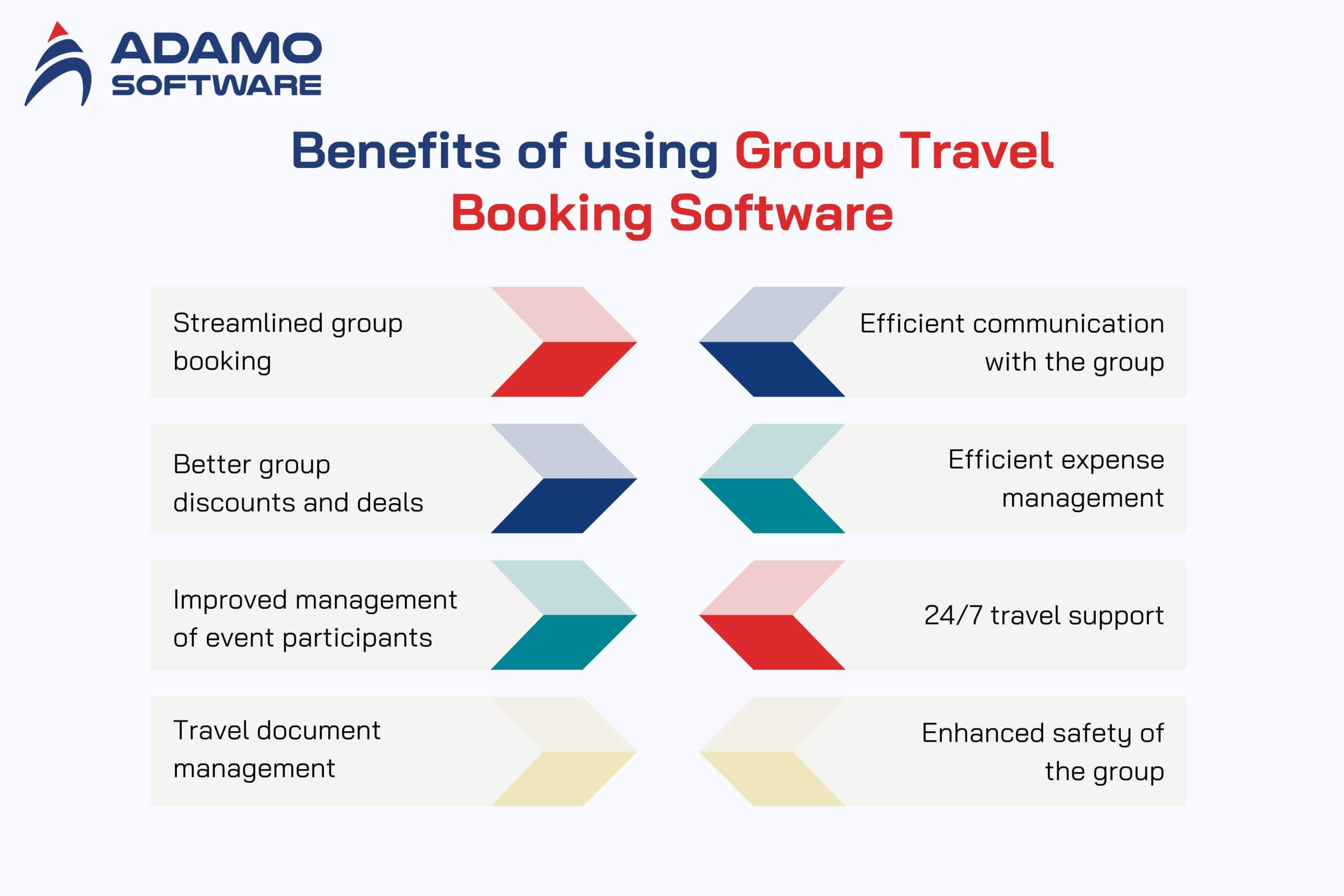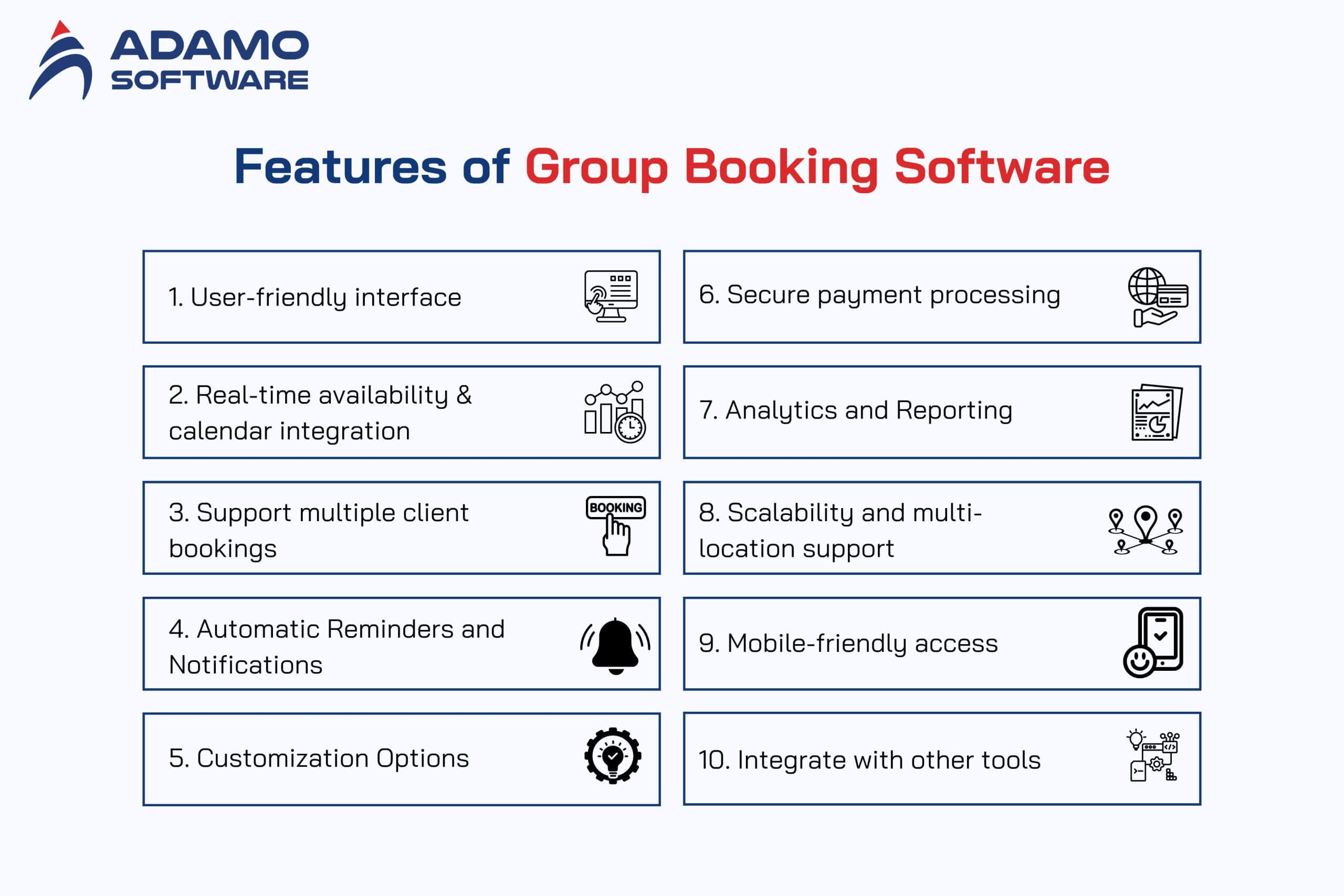Group booking software: Pros, Cons and Future insights

Discover group booking software‘s pros, cons, and future to streamline travel operations and enhance customer experiences.
I. Group booking software: An overview
In the past few years, growth in the global tourism industry has been driven by pent-up demand. However, in 2024, the tourism industry will see a modest increase compared to 2023. This signals that the tourism industry is entering a healthy state as fewer tourists flock to airports and border crossings. However, we can now see steady growth globally. Air connectivity and lighter visa requirements facilitate this, with the Middle East leading the recovery.
Despite this, the travel industry could still hit new record highs, according to the latest estimates. For example, the World Travel and Tourism Council predicts the industry will surpass $11 trillion in revenue this year.
Group bookings comprise a significant portion of the vast travel arrangements worldwide. Many travelers enjoy group tours’ convenience, safety, and affordability. Group tours can also be highly profitable for tour operators. Because of the potential for volume discounts, simplified logistics, and additional revenue through upselling. However, the complexity of coordinating large groups and ensuring a smooth experience calls for dedicated software solutions that combine the art of management with science, especially in the context of increasing traveler demands. That is why group bookings are no longer a nice-to-have but a must-have.
This article will cover the main benefits of group booking software for tour operators and the main challenges when handling group bookings. We will also provide guidance on what to look for in group tour management software. We hope that our material will be useful in helping you better understand your actual needs as a tour operator.
II. Benefits of using group travel booking software
Organizing and managing a group trip can be a complex task. Group booking software is handy, from finding the best flight deals to securing accommodation and coordinating transportation.
In this section, we will explore how group booking software can simplify and optimize the management of your event travel.

1. Streamlined Group Booking
Group booking software facilitates streamlining the business booking process and managing group business travel arrangements. It allows for managing group bookings on a single platform, making business travel management easier. It also allows travel organizers to easily search and compare flight, accommodation, transportation, and activity options suitable for group travel.
Furthermore, group booking software can create personalized packages for individuals traveling together. For example, it will consider travelers’ preferences, such as the type of in-flight meal, seat on the plane (window or aisle), or any amenities requested in the hotel.
2. Better Group Discounts and Deals
Organizing a large group’s travel becomes much easier with group booking software. Instead of booking seats or rooms individually, organizers can reserve everything in one go—and often unlock special group rates. This saves time and can lead to significant cost savings, making group trips more affordable and stress-free. Additionally, the software may include price comparison features that allow organizers to compare prices from different suppliers to choose the best deal.
Some group tour booking systems can collaborate with travel management companies (TMCs). These TMCs have relationships with travel service providers, so you can leverage their networks to get competitive prices. By using group booking software, organizers can tap into these partnerships and benefit from the expertise and negotiating power of the travel management company (TMC), which can help them deliver better deals to the group.
3. Improved Management of Event Participants
Group booking software allows travel managers to set up and manage group events directly within the software. This will enable them to enter essential information, such as departure date, event location, etc., into the event description, providing a centralized source of information for attendees. Additionally, organizers can create detailed itineraries to ensure employees have all the necessary details at their fingertips. Once attendees are added, managers can track the entire trip status of each employee.
This functionality allows for more efficient trip management and tracking. Additionally, managers can easily track the booking status of each attendee. This ensures everyone is on schedule and informed of any changes or updates.
4. Travel Document Management
Another key advantage of group booking software is its ability to securely store and organize travel documents in one place. Instead of relying on physical copies or separate emails, members can log into the software and access their relevant documents whenever needed. This reduces the chances of important travel documents being misplaced or lost.
Additionally, group booking software may have additional travel document sharing features. It allows the travel manager to upload important documents such as itineraries and travel guides. At the same time, group members can access these documents whenever needed. Additionally, the software includes features to track document expiration dates, ensuring timely updates and compliance.
Therefore, the travel manager can enter relevant expiration dates for passports, visas, or other documents, and the software can send alerts when the documents are about to expire.
5. Efficient Communication with the Group
Good communication is key to any successful group trip—and that’s where reliable group booking software really shines. All participants and trip details are organized in the software, allowing managers to monitor the entire group’s activities effectively.
This centralized method removes the need for scattered communication through separate email threads or messaging apps. Instead, managers can send updates on the software, and all members will receive notifications about it.
Group booking tools also enable participants to communicate, share updates, and discuss travel details in one place.
6. Efficient Expense Management
Keeping track of group expenses doesn’t have to be a headache. With the right group booking software, participants can log what they spend—on meals, tickets, or any extras—directly in the system. This allows both participants and tour managers to view the total costs incurred during the trip comprehensively.
The software also makes it easy for travelers to upload and organize their receipts efficiently. They can upload digital receipts directly to the platform, eliminating the need for paper receipts. Travelers can create and submit expense reports with just a few clicks, ensuring quick refunds.
7. 24/7 Travel Support
An indispensable benefit of group tour booking software is the ability to provide 24/7 travel support. This ensures 24/7 support through AI-powered chatbots and dedicated support teams. The software’s chatbots must be designed to handle common urgent questions and provide immediate responses. Even outside of regular business hours. Additionally, these chatbots must use artificial intelligence algorithms to understand and resolve participant queries effectively.
Furthermore, group tour management companies also often have dedicated travel support teams. They are available 24/7 to provide personalized support. These teams may include knowledgeable travel experts who can assist staff with various issues.
Whether dealing with emergencies or general travel concerns, support teams must be equipped to provide prompt and reliable assistance. This support enhances the travel experience, reduces stress, and allows business travelers to focus on work without worrying about travel-related challenges.
You can explore about Guide to Build Online Booking Engine for Hotels, Airlines and Travel here.
Ready to Outsource?
Get top-tier IT talent without the hassle. Contact us now!
8. Enhanced Safety of The Group
Group booking tools often come with built-in features to assess and reduce travel-related risks. It allows travel managers to assess risks associated with destinations or travel activities.
The software also keeps participants informed by sending real-time alerts, such as weather updates, flight changes, or safety announcements. This helps them stay prepared for any disruptions and issues during their trip.
Travel managers can also use the software to store emergency contact details, giving participants quick access in urgent situations.
III. Challenges that your group tour booking software should solve
Group booking software can be a lifesaver and boost your operations if tuned to the rhythm your business requires. Here are the most common bottlenecks a travel agency faces that can be redesigned and optimized with technological choices.
1. Finding the best rates
With so many products, suppliers, and moving parts—like coordinating different flights, room types, and traveler preferences—group booking software often turns into a time-consuming manual task. Tour operators usually have to juggle multiple options simultaneously, switching between systems and double-checking every detail to avoid costly mistakes. This task often takes a lot of time and is susceptible to mistakes. By using advanced software solutions that integrate directly with global distribution systems (GDS) and APIs from leading suppliers, travel managers can compare prices in real-time and make faster decisions.
For example, Amadeus, a leading GDS provider, connects travel companies with over 400 airlines, providing instant access to the best prices and seat availability. Partnering directly with large travel companies can be expensive, so exploring alternatives like GP Travel Enterprise is worth considering. This may be a wiser option with over 75 travel providers already connected.
2. Coordination of bookings
Booking a group trip is no easy task. On the one hand, the organizer must ensure that the accommodations, transportation, and activities are synchronized for the entire group. At the same time, they must accommodate the diverse needs of the members. A couple may want to sleep together in a double bed. Meanwhile, families with small children will request an extra bed for their children. Additionally, introverts who like to adventure alone will be willing to pay extra for a private room.
Now imagine that the trip is several days long and something terrible happens at the peak. Your group booking software must be able to handle that task as well and handle changes flexibly. At the same time, it must adjust the schedule or book efficiently without disrupting the overall flow. With access to a rich inventory of on-site travel suppliers and powerful automation tools embedded in your software, the pain of handling group travel bookings is reduced manifold.
3. Calculations and payments
After you’ve added all the services and applied any group discounts, it’s time to handle the payments. The best-case scenario? Your group tour operator software should have a built-in accounting feature that links directly to your payment system. That way, your staff won’t have to bounce between tools just to enter payment details—it can all be done from one place, which saves a ton of time and hassle. This functionality and automated invoicing can help reduce errors and improve transparency. You don’t want any human errors or hassle regarding money matters.
Furthermore, handling payments for group tours can be challenging—some clients want separate invoices, while others prefer consolidated payments. Therefore, your group tour management software should embed multiple payment options, including credit cards, bank transfers, and e-wallets.
IV. Nice-to-have features of group booking software
Here are the nice-to-have features of group booking software to look for when selecting the ideal tool for your business.

1. User-Friendly Interface
A complex system can be overwhelming for both staff and customers. A professional scheduling app should have a friendly, easy-to-use interface that ensures seamless navigation for users of all technical levels. For example, Slotify’s clean dashboard makes it easy for customers to book, reschedule, or cancel appointments with just a few clicks. Business owners can easily view their bookings, track attendance, and manage resources.
Key Benefits:
- Increase employee-customer engagement
- Reduce booking errors Improve customer satisfaction
2. Real-time availability and calendar integration
One of the core features of a group booking system is real-time engagement and seamless integration with external calendars like Google Calendar or Outlook. This eliminates scheduling conflicts and ensures accuracy. For example, a hiring manager uses an online meeting scheduler to coordinate interviews with candidates, syncing their calendars to avoid duplicate appointments.
Key benefits:
- Automatically update status in real-time
- Sync across multiple platforms.
- Minimize scheduling issues
3. Support multiple client bookings.
For businesses that offer group services such as fitness classes, workshops, or events, the ability to book multiple clients at once for a single lesson is critical. Look for a system allowing group scheduling with capacity limits and waitlist options. For example, a cooking school uses a group booking software to manage class registrations, ensuring they do not exceed the kitchen’s seating capacity.
Key Benefits:
- Optimized Resource Allocation
- Efficiently Process Large Bookings
- Increase Revenue Potential
4. Automatic Reminders and Notifications
Missed appointments can cost businesses up to 25% of their revenue. Automatic reminders via email or SMS are essential to reducing no-shows. For example, a sales team uses an appointment scheduling tool to set up meetings with clients with automatic reminders sent 24 hours in advance.
Key Benefits:
- Improved Attendance Rates,
- Reduced Administrative Workload
- Improved Customer Communication
5. Customization Options
Every business has its own needs. A great group booking software should offer customization for your brand, service type, and booking rules. Example: A beauty salon customizes its customer booking page to match its brand colors and offers tiered pricing for group services.
Key benefits:
- Improved and personalized customer experience,
- Flexible booking options
- Professional branding
6. Secure payment processing
Integrating a cross-platform, online payment gateway can improve cash flow and reduce cancellations. With a secure payment gateway in place, customers can confidently book and make payments in one seamless step. Example: A yoga studio uses a class booking software that allows customers to prepay for classes via credit card or e-wallet.
Key benefits:
- Simplified transactions Reduced payment delays,
- Increased customer trust
7. Analytics and Reporting
Customer data-driven decisions are key to growth. Automatically find features that provide insights into booking trends, peak times, and customer preferences. Example: An event planner uses a group event scheduler with built-in analytics to determine their most popular service times and adjust prices accordingly.
Key benefits:
- Improve resource planning Identify growth opportunities
- Enhance judgment to make informed decisions
8. Scalability and multi-location support
As your business grows, your group booking software must scale with it. Multi-location support is essential for companies operating nationwide. Example: A tutoring center with branches in three cities uses a group appointment coordinator to manage bookings across multiple locations.
Key Benefits:
- Unified Management for Multiple Locations,
- Flexibility for Growing Businesses
- Consistent Customer Experience
9. Mobile-Friendly Access
In today’s world, mobile accessibility is a must. Clients and employees must be able to book or manage appointments anytime, anywhere. For example, a personal trainer uses a group booking calendar accessible via a mobile app, allowing clients to book sessions anytime, anywhere.
Key Benefits:
- Convenient for Mobile Users
- Increase Bookings
- Improve Accessibility
10. Integrate with Other Tools
Your group booking software should integrate with tools like CRM software, email marketing platforms, and team collaboration tools to streamline workflows. For example, a sales team uses a sales meeting scheduler integrated with their CRM to record meetings and follow up with customers automatically.
Key Benefits:
- Increased Productivity
- Reduced Manual Data Entry
- Improved Customer Management
V. Future of group tour operator software
Technology continues to evolve, promising even more innovations in the future of group booking software. We can see some new technologies making waves:
- AI and Machine Learning: From predictive analytics to AI Chatbots, these technologies will help tour operators better forecast demand. This will help tailor experiences and improve customer support.
- Improved mobile accessibility: Mobile-first platforms and apps will become the new norm for businesses. They will increase accessibility and provide real-time updates to travelers on the go.
- Virtual and augmented reality: VR and AR allow travelers to stay updated with their tour information in real time. They can also preview their ideal destinations.
- Internet of Things (IoT): Connected devices, such as smart luggage, will enhance travel convenience and safety. Travelers can add additional services like luggage tracking to their travel products.
- Sustainability: Sustainable and eco-friendly travel options are becoming increasingly important. Group travel software supports more sustainable and eco-friendly travel choices.
VI. Leverage Group Booking Software with Adamo Software
Implementing group booking software can be complicated, but with the right technology partner, it doesn’t have to be. At Adamo Software, we specialize in building custom group booking software that fits your specific business needs. Whether you’re a tour operator, travel agency, or event planner, our solutions are designed to streamline your workflow, reduce manual tasks, and enhance the overall booking experience. Let us turn your ideas into solutions.






